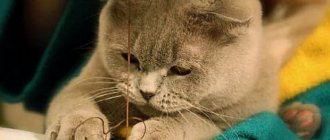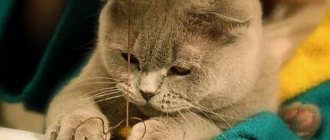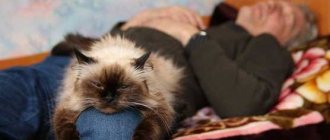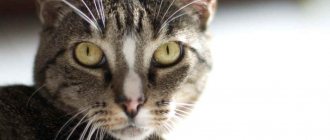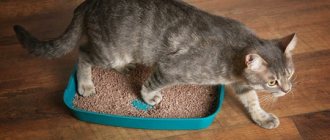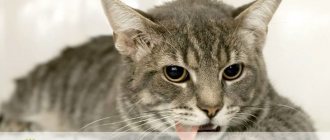Cats are considered the best mothers. Purrs often accept other people's children and not just kittens. Experienced breeders know that the miracle of birth can be overshadowed by the incomprehensible behavior of the young mother. Some cats eat their kittens, and there is no fully adequate explanation for this phenomenon yet.
Does your cat have breeding value and pedigree? Are you planning to breed a certain breed? If the answers are yes, the first thing you need to do is study all the possible nuances of four-legged behavior. The fact is that absolutely everything, even the most cruel and illogical (from your point of view) actions can be justified. Naturally, you won’t be able to predict all the problems and nuances, but everyone can avoid making gross mistakes.
Veterinarians and felinologists explain the fact that mother cats eat kittens in different ways. All theories agree on one thing: we are talking about either cannibalism or accident. Even experienced breeders may encounter this problem when it comes to the first birth of a cat.
Note! Cannibalism is a phenomenon that is the act of eating an animal of its own relative (of the same species and genus). This phenomenon is not (!) rare; it occurs in more than 1000 species of animals and in humans.
How to understand that a mother can kill a kitten?
A potential killer mother avoids her newborn babies in every possible way. To prevent the possibility of eating kittens, you need to carefully monitor the behavior of the expectant mother. On the eve of birth, the animal becomes nervous. Behaves inappropriately. After the birth of small kittens, the cat does not find a place for itself. Instead of feeding them and licking their fur, she runs away and hides. Mom is too hyperactive. A cat kills kittens if there are strange animals in the house. Sometimes this is done immediately, and sometimes after several hours or even days.
Black Cats
Black cats are not harbingers of misfortune, as is commonly believed. On the contrary, their task is to ward off all troubles from their owners. Owners of a black fur coat are able to protect against even the most severe damage. And if a black cat has white paws, then this is a good sign. The owner of such a pet will receive an increase in salary or promotion.
Preventive measures
Cannibalism is not considered a physical disease. Therefore, treatment with medications will not give results. If the owner notices that a pregnant cat has an unstable mental state, manifested by excessive activity, fussiness or irritability, he is recommended to increase monitoring of the animal.
It is important to pay more attention to her and show her love more often. A few weeks before the start of lambing, she is provided with a secluded place where she and her brood will feel calm
This could be a special cat house, a box or a wooden box with soft bedding, an entrance hole and a window for observing the birth in order to provide timely assistance if needed.
Treatment
Why does a cat eat her kittens and does it need treatment?
Unfortunately, cannibalism is not a physical disease at all, so drug treatment is inappropriate. Eating one's own offspring is caused by stress or a failure in the instinctual system. The deviation most often appears during the first birth, and subsequently may never make itself felt again.
If a cat has a persistent tendency towards aggression towards its offspring, it is worth blocking the possibility of reproduction. Since there is a high probability of manifestation of this disorder in subsequent generations.
However, this reaction of the animal can be caused by hormonal imbalance. In this case, prophylaxis is prescribed. Progestins are used to correct disorders.
How to prevent your cat from eating kittens
To prevent your cat from eating her kittens, you should begin preparing for birth two weeks before it occurs. There are a few simple precautions you need to take to help keep newborns safe:
- Prepare a place for childbirth in advance. Dark, quiet, away from other animals and people.
- Competently and correctly choose a diet during pregnancy and after childbirth.
- Observe the pet during and after childbirth, isolate the babies if the mother behaves aggressively.
- Food during and after childbirth should be kept in close proximity to the mother.
- Isolate other animals from the laboring or nursing mother.
Cat cannibalism is an unpleasant and dangerous phenomenon, but it is worth remembering that it is often just a manifestation of instincts. The right approach to organizing the place of birth, proper care and quality nutrition will reduce the risk of killing kittens to a minimum.
Similar articles:
- How to hold a cat correctly
- Do cats sweat?
- Adopt a cat from a shelter
- How cats predict the weather
- How does a cat take care of kittens?
- Why do cats eat grass?
The essence of the problem
Cannibalism is a phenomenon in which organisms are eaten by individuals of their own species. Currently, scientists know that about 1,300 species of living beings practice cannibalism to one degree or another. This number includes insects, amphibians, reptiles, birds, mammals and even humans. Cannibalism can be considered as a manifestation of intraspecific competition, a consequence of natural selection. According to scientists' observations, the cause of intraspecific predation is most often a lack of food and water caused by population overdensification or unfavorable environmental conditions.
As for cats specifically, cannibalism is inherent in them in extremely rare, if not exceptional, cases. Common causes include, for example, accidentally eating a kitten along with the placenta during birth, biting off tails or paws during excessive grooming, eating non-viable kittens, or postpartum eclampsia. The cause may also be genetic failures or hereditary cannibalism, when a cat receives the corresponding genes from its ancestors. It is noteworthy that there are no authoritative scientific works devoted to this phenomenon in cats, but based on the available materials, let's try to figure out what to do if you witness a cat eating its kittens, what reasons there may be for this, and warn newborn kittens against this.
Why do cats kill kittens?
The origins of such a cruel attitude towards furry babies by human standards can be seen by studying the habits of wild cats in their natural environment. For example, in lions, all females become pregnant exclusively from the “king of the pride,” and when, in the process of intraspecific struggle for territory, power goes to another male, he invariably kills all the suckling young left by the previous leader. This helps to stop lactation in lionesses and stimulates the beginning of a new sexual cycle, during which mating occurs with a new “king”. Thus, the offspring of the strongest male survives, which ensures the evolutionary viability of the species as a whole.
Domestic cats are guided by the same thing, despite their long-standing tameness, proximity to human habitation and abundance of food. But why do cats kill kittens from a rival male? How do they distinguish between their own and other people's cubs?
How does a cat behave if the kittens die?
If a tragedy does happen and the kittens die due to the fault of a rival cat, then in the future the cat will behave as the procreation instinct tells it to. For several days she may worry, look for and call her babies, running near the den, and having found corpses, she will try to revive them by licking them and nudging them with her muzzle. And all this looks very sad, given the humanization of animals by the owners.
With increased lactation, psychological discomfort can be aggravated by physical suffering due to overcrowded mammary glands. But the milk soon “burns out”, and the hormonal status triggers the beginning of a new estrus in the body, during which the cat is again ready to mate with any suitable partner.
In some cases, the mother herself becomes the culprit in the death of kittens. Such cases occur due to:
- non-viability, deformity, disease or poor viability of newborns. This is a kind of “sweeping” dictated by natural selection;
- a sharp lack of food or certain nutrients (for example, protein or calcium) for a pregnant cat. In this case, the animal has to choose between its life and the life of its offspring;
- severe stress and psychological trauma. Maternal instinct can fail, turning into postpartum cannibalism, and if such cases are repeated, then it is better to sterilize such a cat.
Source
Can a cat eat kittens? Why do cats eat kittens?
As you already understand, the situation when a cat eats kittens is rare. Can adult male cats kill a kitten because it is alien, sick, or for some other reason? And if so, why do cats eat kittens?
Practice shows that cats rarely kill kittens and mostly through negligence (crushed, strangled, etc.). Therefore, you don’t need to worry too much about this if you have a mother with a litter and an adult cat in your house. There is no need to worry especially if the two of them live in the house and there are no other males.
However, some males, like females, inherit cannibalism. Can a cat kill a kitten because it is a cannibal? Definitely yes. Can a cat bite a kitten for this reason? Yes. If a cat ate kittens, does that mean he is a cannibal? Most likely, yes too.
Article continues after advertisement
But the claim that adult cats can kill a kitten simply because they do not like them, consider them future competitors, or are trying to kill kittens from competing cats is largely a myth. However, tragic situations do happen.
It’s a completely different story if someone else’s cat kills a kitten. There may indeed be intent here. But it does not consist in a sense of competition, as happens, for example, with lions. Most likely, if a cat killed kittens from another father, in fact, this has nothing to do with their father, but with their mother. Thus, the cat, having looked for a female for mating, provokes her to start a new heat as soon as possible, when she can be covered. He knows that while she has small children, she most likely will not flow or show interest in him. But if the cat killed the kitten, he has a chance.
Why do cats eat their kittens?
So, we have sorted out the question of whether cats eat their kittens. Yes, this happens. Now let's figure out whether the fact that a cat ate a kitten is a sign of her mental or physical illness.
Article continues after advertisement
First birth
For a first-time cat, the process of giving birth and the appearance of kittens is very stressful. Primiparous cats may not leave their nest for days due to confusion and anxiety and may eat their kittens due to extreme hunger or thirst. Therefore, during childbirth, the owner must be present nearby and calm the pet.
Also, when all the kittens are born, the owner should make sure that everyone is attached to the cat, since well-fed kittens are calm. The calmer the kittens are, the calmer the cat feels. If there is a kitten that squeaks a lot and refuses to cling to its mother, it is better to feed it with a syringe with a mixture for kittens and return it to the cat again.
In the case when the cat does not leave its nest, the owner should offer it food (preferably something that the cat really likes, or some kind of wet food) and water, placing bowls in the nest. Food and water should be removed as soon as the cat has eaten. If she refuses food and water, you can offer her something to eat after a short period of time. Food and water should not be left in the nest unattended: when dragging or crawling, the kittens can fall into a bowl of water and choke.
Murder by eating placenta
There are situations when a cat ate a kitten during childbirth, intending to eat only the placenta. After giving birth, the cat is exhausted and feels that there are life-giving substances in the placenta. Therefore, cats often eat the placenta after the birth of their next kitten. But sometimes cats eat their newborn kittens along with it. The thing is that they are not always able to gnaw the umbilical cord without harming the newborn. As a result, he sometimes receives injuries incompatible with life. This is one of the reasons why it is better for the owner to be present during the birth and control everything.
Eclampsia
The most common cause is postpartum eclampsia, a condition of acute calcium deficiency. This leads to excessive irritability of the cat, as a result of which it sometimes eats the kitten, bites off its head, or may hit the kitten against the wall.
Such a cat is physically sick and needs therapy, because... eclampsia ends fatally for the mother herself. But first she may develop neurological symptoms, when everything around her is infuriating, when she is ready to kill everyone, including her offspring.
Whether cats eat newborn kittens due to eclampsia immediately or some time after birth depends on when the pathology fully manifests itself.
Sick kittens
Offspring with any physiological problem can also cause a cat to kill her kittens. Among the main factors are the following:
Article continues after advertisement
- the kitten was born sick or weakened;
- the kitten has a congenital anomaly;
- the kitten and its mother have different blood Rh factors, as a result of which it is exposed to mortal danger and most likely will not survive without human help;
- The cat ate a kitten that died naturally.
In this case, the reason that the cat ate the kitten immediately or a week after giving birth was the correct natural instinct. Cats are not people: they will not nurse the sick. If they see that the kitten is not a tenant, they would rather kill it than allow it to live and suffer. This is natural selection.
Did your cat bite and eat your kitten after giving birth? Maybe she's okay. She just sees better than you who will live and grow strong and who will not.
Cat eats dead kitten
If a cat ate an already dead kitten and the kitten itself died, then you must understand that she did this because she is not a person and does not grieve for her dead offspring. The cat ate her dead kitten because it is a nutritious product that will not be unnecessary for the body that was depleted after pregnancy and childbirth. That is, for the cat it became just food.
The cat killed the kitten in a dream
Accidents happen. Cats are very sensitive creatures towards their own, and often towards other people’s offspring. However, punctures also occur when a cat strangles kittens with its body in a dream.
The cat killed someone else's kitten
If a cat ate other people's kittens, she could have done this out of extreme hunger, a sense of competition and other factors. But this rarely happens.
Cannibalism
If a cat eats its kittens, this may indicate another problem - cannibalism. Actually, this is not typical for cats. But there are genetic failures. In this case, the question of whether a cat can bite a kitten takes on new colors.
As a rule, cannibalism in cats is hereditary. That is, there is a high probability that the cat received the corresponding genes from its ancestors. Such a mother can even specially raise kittens and care for them, and then at one fine moment, when they have become plump, the cat kills the kittens for meat. Actually, initially they were only candidates for meat for her. As a rule, cannibalism is the answer to the question of why a cat bit and ate its adult one-month-old kitten, although before that everything seemed to be normal.
Reasons why daddy cat destroys offspring
Cannibalism is inherent not only to domestic cats, but also to cats. As a rule, the female hides her nest from outside animals. But often a cat finds it and destroys the offspring. At the same time, males kill not only strangers, but also their own cubs. One of the likely reasons why cats eat kittens is to stimulate the female to come into heat. If a cat that has given birth feeds its offspring, it will go into heat after 3 to 4 months. If the cubs die, estrus occurs almost immediately after the kittens die. This pushes males to destroy their offspring and thereby stimulate the female to go into heat.
Another reason why cats kill kittens is competition, the struggle for existence. Adult males perceive small kittens as future competitors for food resources, territory, and females. That is why they can destroy both other people's cubs and their own. Also for this reason, at the level of natural instincts, the mother cat tries to place the future nest in a secluded place, inaccessible to other animals.
Can a cat kill a kitten? Deadly attacks
Fights between a cat already installed in your home and a kitten that comes to live there usually do not result in death. I have not noticed. In no case , there are no indications on sites specializing in cat behavior or on forums.
The only rare cases where a cat can kill another is when a female kills her cub or (seen on the Animogen forum) when a (non-parent) cat from outside has entered the house. where there were 5 little kittens. He killed four kittens and fought with the mother, who wanted to protect her babies, but to no avail.
Otherwise, I have not heard, either from my veterinarian, or from those around me, or on blogs or scientific sites in the cat world, of cases where a cat accidentally killed a new kitten with whom it was supposed to share a home.
Ginger cats
A red-haired guest in the house portends the end of difficult times. Such cats are symbols of happiness and joy. Since ancient times, red pets have been associated with the sun. Their appearance in the house promises not only good luck in all matters, but also material well-being. It is also believed that ginger cats protect the house from thieves and attract good friends.
Why does daddy cat eat kittens?
When considering this topic, it must be emphasized that the father of the family has a predisposition to eat his own offspring. It is worth noting several reasons why this happens.
- Just like a woman in labor, the head of the family may experience banal jealousy. Sensing competition for the attention of a female, owner, or a threat in maintaining the boundaries of their territory, cats tend to get rid of their opponents.
- An additional reason may be the female's estrus. When a cat loses her offspring, she quickly recovers and is ready to breed again. Because of this, cats sometimes eat newborns. This fact does not apply to cats living in the same territory as females.
Males in nature are less likely to exhibit cannibalism. This is due to the fact that most often only the female takes care of the offspring. It is on her shoulders that the responsibility for getting rid of sick and weak offspring falls.
Gray cats
Owners of a gray fur coat are the true guardians of the family hearth. Their appearance foreshadows the beginning of a new relationship or the strengthening of an existing union. Gray cats are also good protectors. They protect the house from evil people. If a gray cat is wary of your guest, avoids him or, on the contrary, tries to attack, it means that the person did not come to you with the best intentions. Such a pet is also able to protect its owner from any negativity: the evil eye, damage and even the machinations of evil spirits.
The cat ate newborn kittens: reasons
In the animal world, an unpleasant situation occurs, in human opinion, when a cat eats newborn kittens. Sometimes this happens immediately after birth, as soon as the offspring are born, and sometimes the cat does it a little later. Perhaps this fate befell only one. And perhaps everyone... Why do cats eat their kittens? Is this an accident or a pattern? There are several answers to the question.
A cat (cat) eats kittens - what to do?
Now you know the answer to the question, do cats eat kittens - their own and others'. If such a situation occurred by chance or because the kitten had a pathology, then this is absolutely normal and nothing needs to be done. But if this is not the first time a cat has done this and there are no apparent reasons, then it is sterilized and is no longer used to produce offspring. This indicates a genetic tendency towards cannibalism, which is inherited.
It is also better to castrate kittens from such a cat and not use them when producing offspring, because with a high degree of probability they can also carry the gene for cannibalism.
Rate and share!
How can you tell if a cat can eat kittens?
It is impossible to be 100% sure whether a cat can eat its kittens or whether a particular pet will avoid this attack. There are several warning signs that can be seen with the naked eye.
- During pregnancy the animal became very irritable.
- Nervousness appears after childbirth. Runs away from kittens, cannot sit in one place.
- Initially, the pet is hyperactive.
- There are other animals on her territory with access to her offspring.
But what to do if the cat ate the kittens? Under no circumstances should she be scolded, beaten or even thrown out of the door. What has been done cannot be undone, and the animal will be left with psychological trauma, which can affect subsequent births and attitudes towards motherhood.
Reasons for eating offspring
Cannibalism is the eating of one animal of a given species by another. Distributed mainly among fish, insects, and sometimes found in warm-blooded animals. Females are more aggressive than males. And the reasons are often due to a change in habitat, preservation of offspring, and hunger. It occurs much less frequently in domestic animals.
However, you should not breed pets more than once a year. After giving birth, it takes time to recover, otherwise the cat may eat the stronghold, as it will be exhausted and will not be able to produce healthy offspring.
Prevention measures
Experienced breeders, when detecting such inappropriate behavior in a cat, remove it from further breeding, since cannibalism is inherited. The many reasons why a cat strangles her kittens make them difficult to identify. In this regard, the following preventive measures should be followed:
- Balanced and nutritious nutrition for a pregnant female with the inclusion of vitamin and mineral supplements in food. A veterinarian will help you get recommendations on creating the optimal diet for pregnancy and after birth. Monitoring the level of calcium in the blood to prevent postpartum eclampsia should be done through clinical analysis, since both high and low levels of the mineral in the body are dangerous;
- Preparing the nest in a secluded, quiet and safe place, inaccessible to outside animals. A thick cardboard box or exhibition box is suitable for these purposes. The nest should be placed in a dark place. It should be dry and warm. This organization corresponds as closely as possible to the natural conditions inherent in the cat at the genetic level.
Measures to prevent cannibalism
Perhaps we can say that we have found answers to questions related to cat cannibalism. We can conclude that if such a situation occurred by accident or because the kitten had a pathology from birth, then there is nothing to worry about and no measures need to be taken. But if a cat shows aggression towards its offspring not for the first time and for no apparent reason, then it is better to sterilize it and no longer use it to produce offspring. This is evidence of a genetic tendency towards cannibalism, which will almost certainly be inherited. It is also recommended to sterilize or castrate kittens from such a mother, because they will most likely carry the gene for cannibalism.
In order to prevent cannibalism, it is extremely important to prevent provoking factors during childbirth. Here are some tips to consider if your cat is getting ready to become a mother:
- Monitor your pet closely if she is in an unstable mental state, such as being irritable, aggressive, or overactive.
- Take the pregnant woman to the veterinarian regularly, take care of her comfort, and provide her with proper care.
- During pregnancy, your cat needs your extra attention. Provide her with a secluded, warm and dry place where the animal can feel completely safe.
- During birth and immediately after, there should be no strangers near the cat and kittens. But for the reasons described above, you can’t leave your pet alone either. Take care of an observation post for yourself in advance so that, if necessary, you can assist the woman in labor and save the lives of the kittens.
By following these simple recommendations and taking into account everything discussed in this article, you can almost certainly say that if you have encountered cannibalism in cats in the past, now you know enough about its causes, which means you have something to counter it. If your cat is just preparing to become a mother, you have enough knowledge to protect future babies and prevent aggression towards them from the pet.
Source
Hunting training
For many, the behavior of a cat when she teaches kids to hunt comes as a surprise. At the same time, people do not always understand that what is happening is just lessons that do not pose any danger. As a rule, during such activities, the mother cat can catch the kitten with her front paws, hold it quite tightly, and begin to beat it with her hind paws. At the same time, the cat takes turns biting and licking the baby, in addition, it can also purr, letting the kitten know that it is doing everything right. From the outside, this behavior may seem very strange. In fact, the mother cat is simply showing her babies how to properly grab the victim and then suppress it. These skills can also be useful for young cats in order to defend their territory in the future. Over time, you will notice that the kittens begin to practice the learned techniques on each other.
Later, when the kittens become more mature and are already moving around the entire apartment, it will be possible to observe new lessons that will already include stalking skills and hunting jumps. Here mom will show by her own example how to carefully track down a victim, sneak around, and then attack. It is possible that household members will become victims. Well, then, the kittens will also practice the acquired knowledge, both on each other and on their mother.
why do cats and tomcats need whiskers?
The cat reacts aggressively to the kitten
Well, it certainly won’t kill to kill, they have a taboo on it. But, periodically it can even strangle. Our 6-year-old cat did this when a 2-month-old female kitten was brought into the house. He will squeeze her somewhere in a corner and squeeze her there, roll around, strangle her, she screams like a fool. I must say that sometimes he still does this, although very rarely. The cat is now, thank God, 9 years old, and the cat is 15. The cat is almost twice the size of the cat, but the cat still builds it. Now, though they are almost inseparable, they sleep together.
Cats are accustomed to each other within 1-2 weeks, under your supervision. Usually this time is enough for the cats to get used to it. But whether they will be friends is a big question. It's a lottery. In the neighboring branches there is a lot of information on training cats to friend each other, read it.
I have an 11-month-old cat, neutered; we were recently given a kitten, a 1.5-month-old girl. The cat reacts aggressively to her, rushes and bites. It seems that if we don’t pull him away, he might strangle her. His kitten is not afraid to climb up to play with him. You can see from the cat that he was offended, stopped approaching the owners, all his attention was on the kitten. Can a cat harm a kitten? and how to change this behavior?
Judging by what you describe, the kitten should live under the sofa, never leaving. If he boldly climbs up to the cat, it means he doesn’t see the danger. If he doesn’t see it, it means there’s no danger. Castrate the cat, otherwise in 4 months he will climb on the cat (unless you specifically achieve this))) The probability of friendship is closer to 100%
Source
Pathological causes
Some cats eat newborn kittens for reasons other than natural ones. Sometimes the animal does this because after pregnancy severe disorders began to develop.
Hormonal disbalance
Immediately after conception, colossal changes occur in the animal’s body, including hormonal ones. In such situations, some cats simply do not understand that they have given birth to kittens. Animals aggressively perceive the offspring and eat it immediately after birth.
A similar situation can occur in cats who have had a caesarean section. Outside interference disrupts the natural process of childbirth. A serious malfunction occurs in the animal’s body, under the influence of which the cat eats the kittens.
Mental pathologies
The birth of kittens is an intimate process that each cat experiences differently. If the comfort conditions at the time of childbirth are violated, the female experiences severe stress, which negatively affects her psycho-emotional health.
During childbirth, it is better to protect your pet from strangers and objects. Otherwise, the animal will begin to worry and inadequately perceive the ongoing event.
After giving birth, felinologists do not recommend holding babies in your arms, because this can “interrupt” the natural smell. Cats perceive foreign scents aggressively, so they immediately destroy such kittens.
To prevent a mother cat from eating newborns, it is important for the owner to create the most comfortable living conditions and carefully monitor the nutrition of the pregnant pet. It is advisable to install the baby box in a quiet, secluded place so that the expectant mother is not disturbed by extraneous animals and sounds.
If the cat does not want to be in the place chosen by the owner, it is better to rearrange the box or keep track of where the pet most often spends time. If during childbirth the animal nevertheless begins to eat kittens, you should urgently isolate the offspring, and after a while try to put them back. If a cat hisses and lunges at the kids, it is better not to risk their lives by starting to care for them yourself.
Natural causes of cannibalism
It's more of a coincidence. From which, however, we are not immune. Among them, it is worth highlighting the killing of a kitten by a mother cat in her sleep. Cats are extremely kind and caring towards their own and sometimes other people’s offspring, but misfortunes do happen: cases when a cat carelessly strangles kittens with her body in a dream do occur. Accidents include murder by eating the placenta. After giving birth, the mother cat is extremely exhausted and exhausted. Feeling that there are life-giving substances in the placenta, cats often eat the placenta after the birth of the next kitten. It happens that a cat eats its newborn along with her. The fact is that it is not always possible to gnaw the umbilical cord without harming the kitten; as a result, the newborn may receive injuries incompatible with life. By the way, this is one of the reasons why owners need to be present during the birth of their pet and keep everything under control. From random reasons, let's move on to natural ones, in other words, why a cat can deliberately kill a kitten.

